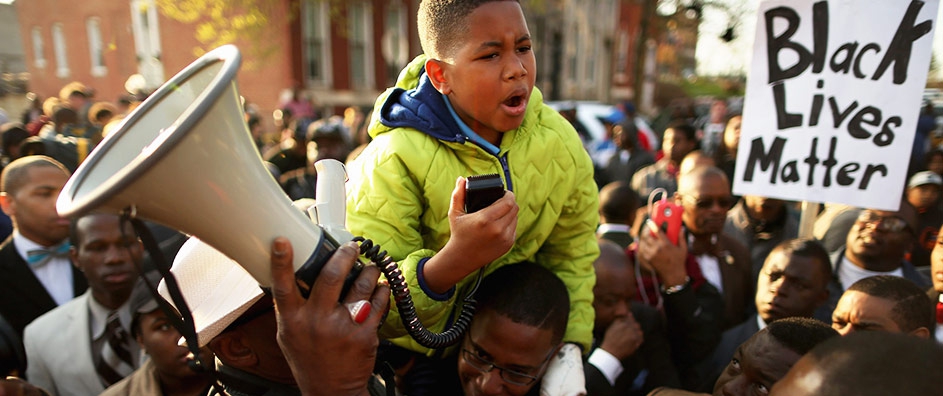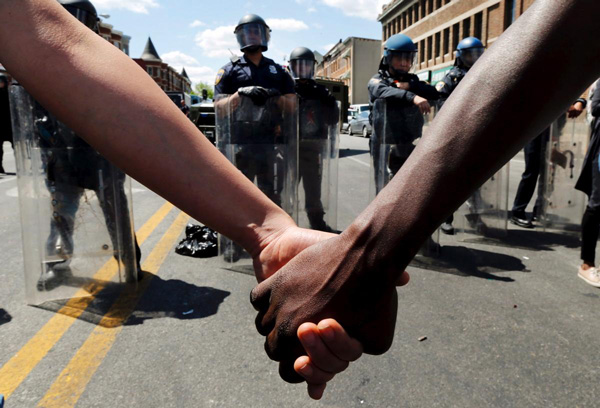The views expressed in our content reflect individual perspectives and do not represent the authoritative views of the Baha'i Faith.
During the past week, we’ve all seen yet more proof that we can’t wish away the issues of race, violence and the justice system in America. In Baltimore, the unexplained death of Freddie Gray has set off huge demonstrations, sporadic violence, the destruction of property and the outrage of millions.
The flashpoint, once again, involves the death of an unarmed black male while in police custody in the United States–but we can apply the same principles anywhere that racial division, prejudice and hatred happen. How can we, as individuals, eradicate the last traces of racism and its ugly effects from our own interior landscape?
The Baha’i teachings on the oneness of humanity offer the world an enormous depth and breadth of solutions when it comes to racism, its effects and its solutions. In just one very specific, clear and pointed passage written in 1936, the Guardian of the Baha’i Faith, Shoghi Effendi, urged Americans to take responsibility for and actively own the issues of race, no matter their color:
A tremendous effort is required by both races if their outlook, their manners, and conduct are to reflect, in this darkened age, the spirit and teachings of the Faith of Baha’u’llah. Casting away once and for all the fallacious doctrine of racial superiority, with all its attendant evils, confusion, and miseries, and welcoming and encouraging the intermixture of races, and tearing down the barriers that now divide them, they should each endeavor, day and night, to fulfill their particular responsibilities in the common task which so urgently faces them. Let them, while each is attempting to contribute its share to the solution of this perplexing problem, call to mind the warnings of Abdu’l-Baha, and visualize, while there is yet time, the dire consequences that must follow if this challenging and unhappy situation that faces the entire American nation is not definitely remedied.
Let the white make a supreme effort in their resolve to contribute their share to the solution of this problem, to abandon once for all their usually inherent and at times subconscious sense of superiority, to correct their tendency towards revealing a patronizing attitude towards the members of the other race, to persuade them through their intimate, spontaneous and informal association with them of the genuineness of their friendship and the sincerity of their intentions, and to master their impatience of any lack of responsiveness on the part of a people who have received, for so long a period, such grievous and slow-healing wounds. Let the Negroes, through a corresponding effort on their part, show by every means in their power the warmth of their response, their readiness to forget the past, and their ability to wipe out every trace of suspicion that may still linger in their hearts and minds. Let neither think that the solution of so vast a problem is a matter that exclusively concerns the other. Let neither think that such a problem can either easily or immediately be resolved. Let neither think that they can wait confidently for the solution of this problem until the initiative has been taken, and the favorable circumstances created, by agencies that stand outside the orbit of their Faith. Let neither think that anything short of genuine love, extreme patience, true humility, consummate tact, sound initiative, mature wisdom, and deliberate, persistent, and prayerful effort, can succeed in blotting out the stain which this patent evil has left on the fair name of their common country. – Shoghi Effendi, The Advent of Divine Justice, p. 39.
So here, for your consideration, are five very specific recommendations for personal, individual solutions from the Baha’i teachings—immediate, practical things you can do in your community to help stop more deaths like Freddie Gray’s from happening:

Just as the Baha’i writings suggest, own the issue, regardless of your color. The injustice and scourge of racism isn’t just a “black problem”—it belongs to everyone. When you own this issue, you’ll naturally want to bridge the racial divide, listen thoughtfully and carefully consider what others say and feel: “Man should weigh his opinions with the utmost serenity, calmness and composure. Before expressing his own views he should carefully consider the views already advanced by others.” – Abdu’l-Baha, The Promulgation of Universal Peace, p. 72.
Work diligently on your own inner prejudices. We all have them. Make a concerted effort to eradicate those attitudes and the self-interest that goes along with them: “Do not listen to anything that is prejudiced, for self-interest prompts men to be prejudiced.” – Abdu’l-Baha, The Promulgation of Universal Peace, p. 42.
Look at every situation with fairness. Don’t condemn the actions of others until you’ve walked in their shoes: “Cleave ye to justice and fairness, and turn away from the whisperings of the foolish…” – Baha’u’llah, Gleanings from the Writings of Baha’u’llah, p. 342.
Work actively and constantly to search out close connections with people from disparate racial and cultural backgrounds—to seek and build the “intimate, informal and spontaneous association” with people of other races that the Baha’i teachings encourage.
Stop thinking of yourself as different or apart from others, and begin considering yourself as part of one human family: “Turn your eyes away from foreignness and gaze unto oneness, and hold fast unto the means which conduce to the tranquility and security of the people of the whole world.” – Baha’u’llah, Baha’i World Faith, p. 182.
We often think of racism as an issue that belongs solely to those who suffer its effects. But that defeats the purpose, blames the victims, and means the majority fails to hear the cries or feel the pain of the minority.
When questions and controversy about race arise, some people tend to think of the entire race-based conversation as a one-sided diatribe, describing and denouncing bias and prejudice that they just can’t see—and don’t think they have. As a result, people of color often feel unheard and ignored despite their calls for justice, and frustrated that the dominant culture can’t or won’t acknowledge the issues.
Instead, Baha’u’llah asks everyone to be “upholders and defenders of the victims of oppression,” so no matter our skin color, we can all make our utmost effort, “day and night,” to put that principle into practice. Above all, remember the Baha’i admonition: “Let neither think that the solution of so vast a problem is a matter that exclusively concerns the other.”
You May Also Like
Comments


















I think introspection is needed all around. That, of course, starts at the personal level, and is perhaps the first and most important task facing each individual. As far as being a “white male,” so to speak, I’m both skeptical and somewhat resentful of that label supposedly being a marker for having the world laid at one’s feet. Personally, I’ve never experienced that. Even with those supposed advantages, and with a college degree, I’ve spent a good portion of my adult working life one paycheck away from homelessness, and without health insurance. (After all, one can’t afford ...the payroll deductions for insurance when rent has to be paid.) We also must consider that many white men are steeped in cultural traditions that hinge one’s very sense of honor on the perception of fierce independence and absolute self-sufficiency. And if we’re perceived as holding all the advantages, that can put white men in the position of being thought of as the least likely to need help, as well as the least likely to ask for it. Therefore, it doesn’t surprise me that we’re one of the most at-risk demographics for suicide.
Considering another matter, I recall hearing the story of an immigrant family from Nigeria that came to the U.S. with virtually nothing, and yet achieved considerable success within roughly a generation or so – thereby demonstrably defying many preconceptions from all sides about blacks and their chances in America. Indeed, some point to immigrants of all colors as examples of inspiration. I speculate this could be mostly for three reasons. First, they often still have strong and intact families (and by that, I mean multi-generational extended families.) Second, no matter how bad some of us might think we have it, they’ve probably seen far worse – so things that might knock some of us on our backsides won’t even make them blink. And third, they are far more likely to have a fresh, idealistic and optimistic point of view – in other words, they aren’t loaded down with the baggage many Americans pack around in the way of preconceived notions, bad history and still-festering wounds centered on race, class, bigotry, opportunity, etc.
My job as a white male is to keep myself in a place of introspection and accountability and to communicate with others of my communities (male community, white community, Detroit community, 30-somethings community, etc). It is toward ...love of others that I take this role serious. And it is not my role/lane to formulate an opinion/action against the actions of those who are oppressed with whom I do not share experience.